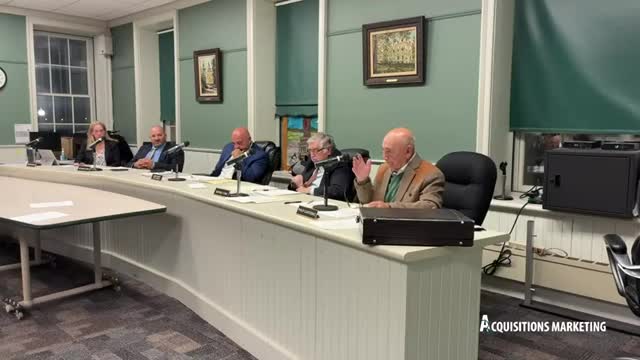Residents and officials urge moratorium on battery storage projects while town studies safety and zoning
Get AI-powered insights, summaries, and transcripts
Subscribe
Summary
Board members and multiple residents urged a temporary halt on battery energy storage system (BESS) approvals after public comment highlighted fire, toxic-emission and emergency-response concerns; the board agreed to further study options including a moratorium.
Town officials and members of the public pressed for a temporary moratorium on battery energy storage system (BESS) projects in Goshen at the Oct. 23 meeting, citing fire risk, hazardous emissions and gaps in local regulation and emergency response planning.
The comprehensive-plan committee raised concerns that thermal-runaway fires, toxic gases released during battery combustion, limited effective suppression methods and questions about commercial ownership and equipment swaps create public-safety and environmental risks. Committee members and residents said BESS technology is evolving quickly and argued the town should pause new approvals while staff and the committee complete a study and propose zoning or permitting safeguards.
Multiple speakers recounted experiences and research from other municipalities. A resident who identified himself as Chris Healy said testing and real-world incidents show BESS fires can be protracted, difficult to extinguish, and can emit toxic smoke; another resident urged the town to obtain independent technical review rather than rely on applicant-paid consultants. Planning-board members told the board they had several outstanding technical questions after recent applicant presentations, including safe setback distances, fire-suppression strategies, equipment-chain-of-custody and whether proposed installations comply with current zoning.
Officials said two active or recently filed BESS-related applications exist in a Harley Road overlay district; the planning board has referred those requests to the zoning board for waivers where necessary. Board members said they would consider drafting a short-term moratorium patterned on the town’s prior solar moratorium to allow time for staff, emergency services and the planning board to define objective standards, training requirements for first responders, site-design and decommissioning requirements, and minimum insurance or escrow obligations before any local approvals proceed.
No formal moratorium was adopted at the Oct. 23 meeting. Board members directed staff and the comprehensive-plan committee to prepare a proposed moratorium ordinance and a short technical checklist about public-safety and environmental safeguards for board consideration.
